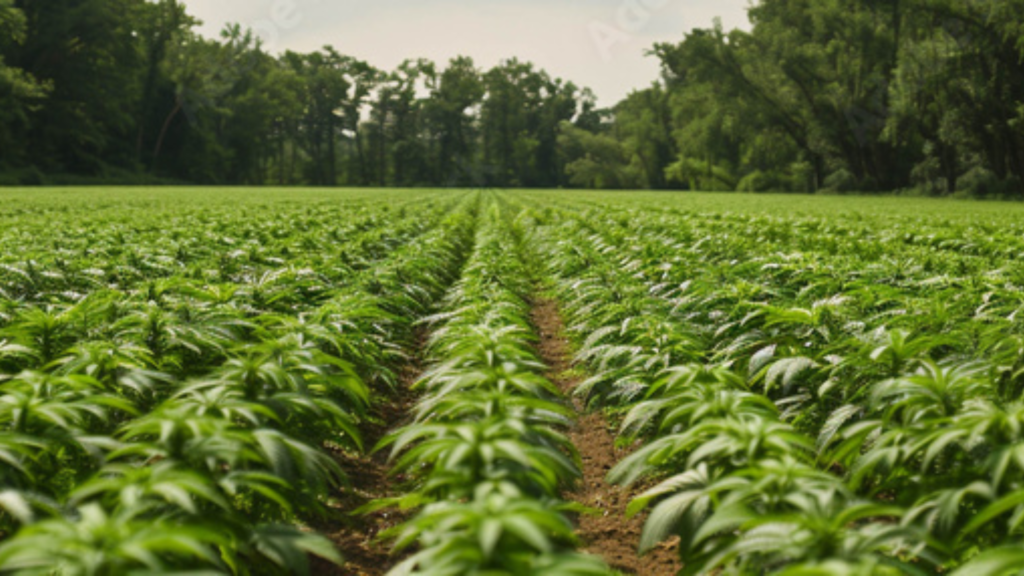Introduction
Hemp has recently gained recognition as a crop with enormous potential for use in agriculture that is adaptable and sustainable. Hemp is rapidly becoming a great resource for sustainable agricultural methods due to its many uses and various environmental advantages. The purpose of this blog is to examine the many benefits of hemp farming, including its effect on soil health, water conservation, carbon sequestration, and its potential to completely transform the agricultural sector.
Benefits of Hemp for Sustainable Agriculture
Hemp as a Versatile Crop
A unique crop noted for its adaptability is hemp. It is a great option for sustainable agriculture since all of its parts can be used for numerous things. Hemp fibers are recognized for being strong and long-lasting, which makes them perfect for use in the manufacture of textiles, paper, and building supplies. Hemp seeds are significant in the food and health industries because they are high in protein and vital fatty acids.
Additionally, hemp biomass may be turned into biofuels and biodegradable plastics, lessening our reliance on toxic synthetic materials and fossil fuels.
Health and Renewal of the Soil
The favourable effects of hemp farming on soil health are among its most important advantages. Since hemp has a deep root system, it may help loosen up compacted soil, which strengthens the soil’s structure and improves water penetration. Deep-rooted hemp plants also aid in nitrogen cycling and erosion control. Herbicides are not necessary, as hemp naturally suppresses weeds as it develop. Additionally, growing hemp serves as a cover crop, creating a barrier that stops soil erosion and nutrient leaching.
Climate Change Mitigation and Carbon Sequestration
Finding efficient techniques to remove carbon from the atmosphere is essential in the face of climate change. As a very effective carbon sequester, hemp presents a possible answer. Hemp plants significantly absorb carbon dioxide (CO2) during photosynthesis, assisting in the reduction of greenhouse gas emissions. Additionally, hemp’s rapid growth rate enables numerous harvests within a year, maximizing its capacity for carbon sequestration.
Conservation of water
Globally, there is rising worry over water scarcity. A sustainable substitute for crops that require a lot of water, like cotton, is hemp production. Hemp is a great option for areas experiencing drought or having a restricted supply of water since it uses far less water to grow than other crops. Additionally, by retaining moisture in the soil, its deep root structure lessens the need for irrigation. Farmers may help with water conservation initiatives and advance sustainable water management by adding hemp to their agricultural practices.
Wildlife Habitat and Biological Diversity
A wide variety of species can find a variety of habitats in hemp fields. Bees, butterflies, and other pollinators are drawn to the plant’s pollen and nectar-rich blossoms, which support ecosystem health and biodiversity. On farms, hemp farming may also improve biodiversity by linking fragmented ecosystems and establishing animal migration corridors.
Disease and Pest Management
Hemp is a desirable crop for organic farming because of its inherent resistance to pests and illnesses. Hemp uses fewer pesticides than many other crops, lowering the possibility of dangerous chemical residues in the land, water, and food. This trait is advantageous to farmers, as well as better ecosystems and more secure food production systems.
Economic Potential
Hemp has a huge economic potential. Its adaptability and wide range of uses provide farmers with the chance to diversify their sources of revenue. Growing consumer demand for hemp-derived goods like CBD oil, textiles, and industrial materials has created a profitable market for growers and business owners. Farmers may improve their economic resilience and support a healthy agricultural economy by using hemp in their crop rotation.
Regenerative Agriculture Techniques
Hemp fits in nicely with the tenets of regenerative agriculture, a comprehensive strategy intended to boost ecosystem resilience, increase biodiversity, and improve soil health. Hemp acts as a cover crop, smothering weeds and lowering the demand for artificial fertilizers, insecticides, and herbicides. Through the breaking up of compacted soil, its large root system improves water penetration and nutrient absorption. Farmers may improve soil fertility, lessen their negative environmental effects, and develop more sustainable agricultural systems by incorporating hemp into regenerative farming techniques.
Hemp and Crop Rotation
Crop rotation is a crucial component of sustainable farming. Including hemp in crop rotation programs can provide several advantages. Hemp is a great rotation crop because of its capacity to control weeds, its low fertilizer needs, and its beneficial effects on soil health. Farmers may disrupt pest and disease cycles, stop soil erosion, and increase crop output by rotating hemp with other crops.
Phytoremediation using Hemp
In phytoremediation, the practice of employing plants to remove toxins from the soil, hemp has demonstrated great promise. Hemp may absorb heavy metals, poisons, and pollutants from polluted soil because of its deep roots and quick development. Due to this property, hemp is a useful instrument for cleaning up and recovering contaminated soil, reviving ecosystems, and enhancing the quality of the environment.
Conclusion
There is no denying hemp’s advantages for sustainable agriculture. Hemp provides several benefits that can revolutionize the agricultural sector, from enhancing soil health and water conservation to carbon sequestration and economic viability. As we work towards a more sustainable future, adopting hemp production and incorporating it into our farming methods may be extremely important for creating resilient and environmentally friendly farming systems. We can create a more lucrative and sustainable future for farmers as well as the globe by utilizing the potential of hemp.


Pingback: Earth Day and Sustainable Wellness with Hemp - Sun State Hemp Blog
Pingback: NAP Limited - The Environmental Impact of Hemp Production
Pingback: Sustainable Agriculture - Importance & Components
Pingback: Harnessing AI in Agriculture: Pioneering India's Next Green Revolution for a Sustainable Future